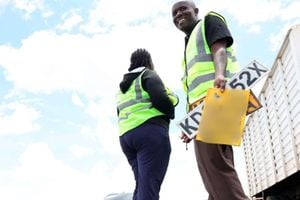Activists decry ‘slow progress’ at COP28 summit

From left: Dr Philip Osano, Stockholm Environment Institute Centre Director of Africa, former 800m Olympic champion David Rudisha and Ms Susan Mbae of Global Climate Action field questions from ‘Nation’ journalist Hellen Shikanda at COP28 in Dubai on Friday.
What you need to know:
- A contentious debate on fossil fuels phase-out versus its phase-down continues to rock the negotiations.
- Activists call for outcome that will yield a fast, fair, and fully-funded transition from fossil fuels.
A caucus of civil society groups attending the 28th Conference of Parties (COP28) are decrying the slow progress as the summit draws to a close.
Tomorrow is the set end date of COP28, but in some cases, like in Egypt last year, an extension is possible when parties fail to agree on the outcome of the text.
Based on the Nairobi Declaration and the interests of the African continent, some of the issues that civil society groups hoped to be on the fore are adaptation finance and a shift to renewable energy.
In a joint press briefing organised by 350.org, Power Shift Africa, and ACCESS Coalition, their representatives urged negotiators to back an outcome that will yield a fast, fair, and fully-funded transition from fossil fuels.
A contentious debate on fossil fuels phase-out versus its phase-down continues to rock the climate negotiations.
At the moment, Africa’s energy mix shows that fossil fuels such as coal, oil, and gas take up more than 70 per cent of usage in different sectors.
The International Energy Agency (IEA) warns that if the policies that are currently in place keep being used, the world will warm to levels that will surpass the one set under the Paris Agreement.
“With today’s policies, the global average temperature rise is likely to hit two degrees Celsius around 2050, but this would probably result in a median temperature rise of 2.7 degrees Celsius in North Africa. That would reduce African GDP by around eight per cent in 2050 relative to a baseline without any climate impacts. Losses in some regions such as East Africa would reach around 15 per cent,” shows an IEA analysis last year.
Speaking on the sidelines of COP28, the three CSOs warned that the current fossil fuel-based energy system in Africa has failed to deliver energy access to the continent while leaving more than half a billion Africans energy-poor.
“The two per cent (about $60 billion) investment received by the continent in the past decade for renewable energy development is unfair, unjust, and unacceptable,” they said.
They now demand that renewable energy usage be scaled up to more than 15,000 GW by 2030 or an average of 1,500 GW every year to ensure the 1.5 degrees Celsius temperature target is not surpassed.
“This COP is not the place to protect countries’ selfish interests. Taking such a position would be absurd. This COP should be a place to forge collaborations that allow all countries to phase out fossil fuels,” said Mr Amos Wemanya, Just Transitions lead, Power Shift Africa.
Dr Jeni Miller, Executive Director of the Global Climate and Health Alliance and one of the Climate and Health envoys for COP28, said in a statement yesterday that the difference for people’s health of phasing out only ‘unabated’ fossil fuels, versus a full fossil fuel phase-out, is night and day.
“Coal, oil and gas are responsible for significant health harms at every stage, from extraction, through processing and transport, to when they are burned,” she said.
Ms Florence Gichoya, representing the ACCESS coalition, said a just transition for energy in Africa should focus on Africans’ needs. “Every decision we make at this COP will affect us not just now but for generations to come. What we decide today will be stuck with us forever,” she said.





